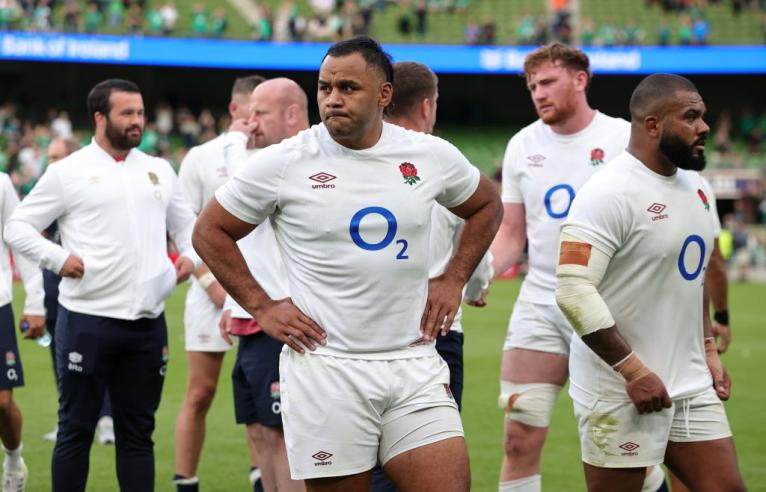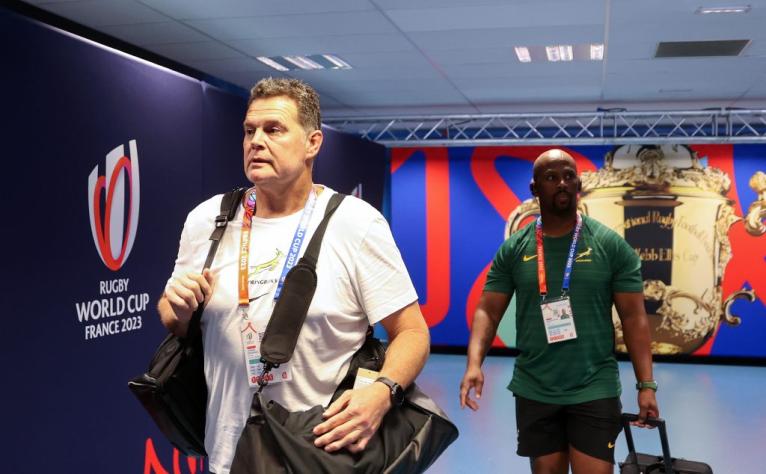Billy Vunipola said this week England have no problems being “public enemy number one” in the knockout stages of the Rugby World Cup. And so they should be relaxed in the role as the team everyone loves to hate. They’ve been playing it for years.
In 2003 then-England coach Clive Woodward declared “the other 19 countries do not want England to win this World Cup…We could list a whole load of quotes from French people, and Scottish and Welsh and Irish. It’s just something to do with being English.”
Woodward could have added Australians. When the Wallaby pair of George Gregan and Joe Roff were asked who they wanted to win the 2003 World Cup if it couldn’t be them, they replied: “Anyone but England.”
Oh well, you can’t always get what you want.
Much of this hostility is fed by historical grievances, real or imagined. Phil Bennett’s pre-match speech to his Wales team before their 1977 Five Nations match against England has become part of rugby’s folklore. “Look at what these b******s have done to Wales,” raged Bennett. “They’ve taken our coal, our water, our steel. They buy our houses and live in them for a fortnight every 12 months. And what have they given us? Absolutely nothing.”
Nothing? England gave Wales rugby, Mr B.

Put those two reasons together and there is why the world wants to beat England. In a 2003 essay in the International Journal of the History of Sport about rugby and the Springboks, the South African writer Dean Allen concluded Afrikaners “adopted rugby as a means of heightened expression of their uniqueness and individuality free from imperial control, and indeed as an opportunity to beat the English at their own game”.
Traditionally, at least in financial muscle and player numbers, rugby’s two superpowers are England and France. England’s influence is waning given the parlous state of the domestic game, and with French rugby going from strength to strength they may soon be the only giant in the sport.
But they’ll still never evoke the same emotions among their international opponents as England; because when Les Bleus play Fiji, Wales, Canada, Argentina, Ireland, New Zealand or the Boks there are no wars or still-smouldering imperial rivalry to use as motivation.
South Africa, on the other hand, are the southern hemisphere’s England: playing a dreary, conservative, muscular rugby; too much pragmatism and not nearly enough panache.
What might a 21st century Phil Bennett rail against in the dressing room at Stade de France to fire up Wales? Boys, remember that surly Parisian waiter who once overcharged you or that alluring but enigmatic French girlfriend who dumped you – well, today we take our revenge.
Rugby is a very Anglophone sport and the French have always been – or they certainly were before the emergence of Argentina and Italy – the outsider. There was the language barrier, the difference in national character and the contrast in how France played their rugby compared to the Celts and Anglo-Saxons.
If familiarity has bred rugby contempt between the major Anglophone nations, the unfamiliarity with France has bred incomprehension. Pundits such as the erudite Benjamin Kayser are gold dust because he’s one of the few former French internationals who can shed some light for an Anglophone TV audience on some of the complexities of his compatriots.
 Antoine Dupont was one of two players to be red carded when France beat South Africa in a thriller last November (Photo SYLVAIN THOMAS/Getty Images)
Antoine Dupont was one of two players to be red carded when France beat South Africa in a thriller last November (Photo SYLVAIN THOMAS/Getty Images)
These mysteries have always been more pronounced in the southern hemisphere where most people might visit France once or twice in a lifetime. Even rugby players who arrive to play Tests see little of the country as they are shuttled between hotels and training grounds.
South Africa, in particular, barely know the Bleus. They have played just 17 Tests this century, whereas France have met New Zealand on 29 occasions and Australia 23. The Boks, in contrast, have played 28 Tests against both England and Wales in the same period.
Matches between France and South Africa are to be savoured therefore, not just for their rarity but also for their competitiveness. Eight points in total have separated the two sides in their last three Tests with the most recent result being a 30-26 victory for France in November.
That match generated a modicum of pre-match excitement in France but not remotely the same hype that surrounds New Zealand when they come to Paris. France holds the All Blacks in awe. They are icons: exciting, glamorous and ruthless. The French think of themselves as Europe’s answer to the All Blacks.
France, of course, have their own historical legacy to deal with but it is on the football field against the likes of Algeria, Tunisia and Senegal.
South Africa, on the other hand, are the southern hemisphere’s England: playing a dreary, conservative, muscular rugby; too much pragmatism and not nearly enough panache.
The French respect South Africa but they don’t admire them the way they do New Zealand, and nor do fear them to the same extent.
Perhaps that explains why France have a better record against South Africa: played 46, won 12, drawn 6 and lost 27. Against New Zealand, France have won 14, drawn once and lost 48. It has been suggested France are the All Blacks’ bogey team. Nonsense, They’ve notched a handful of memorable victories, including two in the World Cup, but these are the exceptions in an otherwise long list of losses.
Remarkably, France and South Africa have met only once before in the World Cup: the 1995 semi-final in Durban, when it rained cats and dogs in the morning and King’s Park was more paddling pool than rugby pitch. The Springboks won 19-15 but there are many French fans who swear to this day Abdel Benazzi splashed over for a try in the dying minutes that was never awarded.
Few of the players on Sunday were alive in 1995. The match is history. But not emotional history. How much easier would it be for Rassie Erasmus to motivate his men if the Boks were playing New Zealand or, better still, England.

France, of course, have their own historical legacy to deal with but it is on the football field against the likes of Algeria, Tunisia and Senegal. When France and Morocco met in the semi-final of last year’s World Cup, one French historian said that for the latter the motivation was a ‘desire for revenge’.
On Sunday the French will play with a different ball against a nation from the other end of Africa. The fact that there is no ‘history’ between the two protagonists won’t dampen the atmosphere in the Stade de France, which is sure to be electric. A World Cup semi-final beckons and, what’s more, it might be against England. What more motivation does any international rugby team need?



I think England & Boks are gonna meet in the finals!!!!
The last night match between Ireland & All Blacks, l feel sorry for lreland the Ref was absolutely not on their side, that Ref was supporting All Blacks, so he was the 16th player, shame on him. I wish he could have opportunity when he gets home & watch that match again & rate himself!!!!!
Can anyone help me here, is it the standard rule or binding law, when all these Teams displaying their, Haka the opponent shouldn’t warm themselves up & must stand still & watch while the other team is warming themselves by displaying this Haka
Pleased to be playing the Irish and not the boks tomorrow..
John Smit said that the refs "don't dig the Boks". And the breaking news is that the French don't either?
Fair enough. But they seem happy enough to pay saffas big bucks to play in the Top 14, and to pick them for the national team. I guess digging and picking winners is not the same thing.
France love the beautiful one. The English and boks content themselves with an ugly win. It's a matter of class.
I have no problem with this "journalist's" opinion that France don't respect the Boks the same way that they do NZ. However, this person is certainly not someone that watches Springbok rugby, because only someone that doesn't watch Bok rugby can ignore the changes in playing style that have been implemented in the last few years. I was at the match in Marseille last year and all of the French spectators that spoke to us after the game acknowledged that we played the better and more attractive rugby. In addition, I read the comments on a lot of French sites and they said the same, the Boks did all the pretty stuff while the French played the tight, "boring" game. Lastly, I have been watching Springbok rugby since the early seventies. Our boring style of a few years ago is not our DNA, anybody that says that has never heard of or seen Danie Gerber, Ray Mordt, Carel du Plessis, etc.
Don't even want to try to pick it, just know it's going to be a damn good game, ABS v ireland as well, I hope the ensuing Semis and final aren't too much of a drop off.
They are in for a BIG surprise if they think we are going to play a dreary brand of rugby 😂 . I think the boys are going to Attack attack attack like never before. If Manie starts, then they better fasten their seatbelts 🤗 If pollard starts then we will play more conservatively for 60 mins, soften them up and then unleash.
Go France
IT will be a horrible tragedy if the saffers win
For the sake of rugby and all things descent and holy, please god make the evil AWB boys choke on humble pie.